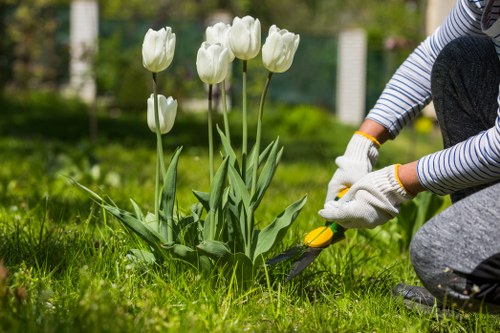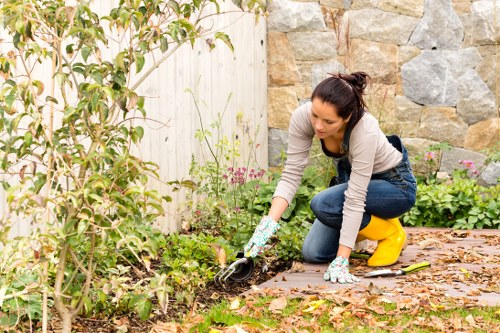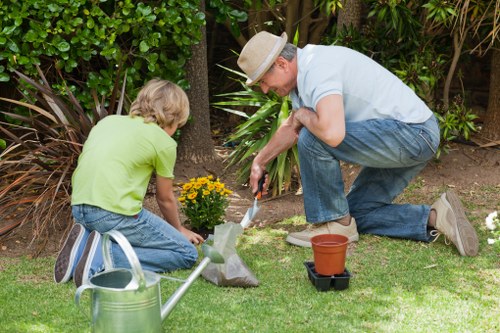Garden Maintenance in Gardener Gardening

Garden maintenance is a crucial aspect of keeping your outdoor space healthy, vibrant, and enjoyable. Whether you’re a seasoned gardener or just starting out, regular upkeep ensures that your plants thrive and your garden remains a beautiful oasis.
Maintaining a garden involves a variety of tasks, from routine watering and weeding to more specialized care like pruning and pest control. Understanding and implementing effective garden maintenance practices can transform your garden into a stunning and sustainable landscape.
In this article, we will explore the essential aspects of garden maintenance within the realm of gardener gardening, providing you with valuable insights and practical tips to enhance the beauty and productivity of your garden.

Importance of Regular Garden Maintenance
Regular garden maintenance is vital for several reasons. It not only ensures the aesthetic appeal of your garden but also promotes the health and longevity of your plants. Neglecting maintenance can lead to overgrown plants, increased susceptibility to pests and diseases, and a decline in the overall quality of your outdoor space.
Consistent upkeep helps in identifying and addressing issues early, preventing minor problems from escalating into major concerns. Additionally, a well-maintained garden can enhance your property value and provide a peaceful retreat for you and your family.
Furthermore, garden maintenance contributes to environmental sustainability by encouraging practices such as composting, water conservation, and the use of organic fertilizers, reducing the need for harmful chemicals.

Benefits of a Well-Maintained Garden
- Enhanced Beauty: Regular maintenance ensures that plants are healthy and aesthetically pleasing.
- Improved Plant Health: Timely care reduces the risk of diseases and pest infestations.
- Increased Property Value: A beautiful garden can significantly boost your home's market appeal.
- Environmental Impact: Proper maintenance supports biodiversity and promotes sustainable practices.
- Mental Well-being: A well-kept garden provides a relaxing environment, contributing to mental health.
By investing time and effort into garden maintenance, you reap these benefits and create a space that is both functional and picturesque.

Essential Garden Maintenance Tasks
Lawn Care
Lawn care is a fundamental component of garden maintenance. It involves regular mowing, fertilizing, and aerating to ensure a healthy and lush lawn. Proper lawn care not only enhances the overall appearance of your garden but also provides a resilient surface for outdoor activities.
Key lawn care practices include:
- Mowing: Regular mowing at the appropriate height encourages strong root growth.
- Watering: Consistent watering, especially during dry periods, maintains grass health.
- Fertilizing: Applying the right fertilizers supplies essential nutrients to your lawn.
- Aerating: Aerating the soil improves air and water penetration, promoting deeper root systems.
By adhering to these practices, you ensure that your lawn remains green, healthy, and inviting throughout the year.

Pruning and Trimming
Pruning and trimming are essential for maintaining the shape and health of your plants. Regular pruning removes dead or diseased branches, promotes healthy growth, and enhances the overall structure of your garden.
Effective pruning involves:
- Timing: Prune during the appropriate season for each plant type.
- Technique: Use the correct cutting methods to avoid damaging the plant.
- Tools: Employ sharp and clean tools to make precise cuts.
Trimming helps in controlling plant size, encouraging flowering, and maintaining a tidy appearance, contributing to the overall aesthetic of your garden.
Weed Control
Weeds compete with your garden plants for nutrients, water, and sunlight, making weed control a critical maintenance task. Effective weed management ensures that your plants can thrive without unnecessary competition.
Strategies for weed control include:
- Manual Removal: Hand-pulling weeds is an organic method to keep your garden free from unwanted growth.
- Mulching: Applying mulch suppresses weed growth by blocking sunlight.
- Herbicides: Use targeted herbicides cautiously to eliminate persistent weeds.
Implementing these strategies helps maintain a clean and healthy garden environment.
Seasonal Garden Maintenance
Spring Maintenance
Spring is a time of renewal, making it an ideal season for garden maintenance. As temperatures rise and plants begin to grow, it's essential to prepare your garden for the upcoming seasons.
Spring tasks include:
- Soil Preparation: Test and amend soil to ensure optimal conditions for plant growth.
- Planting: Start planting new flowers, vegetables, and shrubs to establish your garden.
- Pruning: Remove dead branches and shape plants before the growing season begins.
These actions set the foundation for a thriving garden throughout the year.

Summer Maintenance
Summer brings warm weather and abundant sunlight, which can be both a blessing and a challenge for garden maintenance. Proper care during this season ensures that your plants remain healthy and resilient.
Key summer maintenance tasks include:
- Watering: Ensure consistent watering, especially during dry spells, to prevent plant stress.
- Pest Control: Monitor for and manage pests that thrive in the summer heat.
- Mulching: Replenish mulch to retain soil moisture and regulate temperature.
By addressing these tasks, you support plant health and maintain the vibrancy of your garden.

Fall Maintenance
Fall is a transitional period where gardens prepare for the colder months ahead. Proper maintenance during this season helps protect your plants and prepares your garden for winter.
Essential fall tasks include:
- Leaf Removal: Clear fallen leaves to prevent mold and pest issues.
- Plant Protection: Shield sensitive plants from frost and cold temperatures.
- Soil Enrichment: Add compost or manure to enrich the soil for spring growth.
These practices ensure that your garden remains healthy and ready to thrive in the next growing season.

Winter Maintenance
Winter maintenance focuses on safeguarding your garden during the dormant season. Proper care ensures that your plants survive the cold and emerge healthy in the spring.
Winter tasks include:
- Pruning: Trim plants to remove damaged branches and promote healthy growth.
- Protecting: Use covers or mulches to shield plants from harsh weather conditions.
- Equipment Care: Clean and store garden tools to prolong their lifespan.
By performing these tasks, you maintain the integrity of your garden through the winter months.

Tools and Equipment for Garden Maintenance
Having the right tools is essential for effective garden maintenance. Investing in quality equipment not only makes tasks easier but also ensures that your garden receives the best care possible.
Essential Tools
- Pruning Shears: For precise trimming and shaping of plants.
- Lawn Mower: Keeps your grass neatly cut and maintained.
- Garden Hoe: Useful for weeding and cultivating the soil.
- Watering Can or Hose: Ensures your plants receive adequate moisture.
- Gloves: Protect your hands while performing various garden tasks.
Maintaining your tools by cleaning and sharpening them regularly extends their usability and effectiveness.

Hiring a Professional Garden Maintenance Service
While DIY garden maintenance can be fulfilling, hiring a professional service offers numerous advantages, especially for those with busy schedules or extensive gardens.
Benefits of Professional Services
- Expertise: Professionals have the knowledge and experience to handle a wide range of garden maintenance tasks.
- Time-Saving: Delegating maintenance frees up your time for other activities.
- Customized Care: Tailored maintenance plans address the specific needs of your garden.
- Quality Results: Professionals ensure that maintenance is performed efficiently and effectively.
Choosing a reliable garden maintenance service can significantly enhance the health and beauty of your garden.
DIY Garden Maintenance Tips
For those who prefer a hands-on approach, here are some practical DIY garden maintenance tips to keep your garden in top shape:
- Plan Your Garden: Design a layout that accommodates the growth patterns and sunlight requirements of your plants.
- Regular Monitoring: Inspect your plants regularly for signs of pests, diseases, or nutrient deficiencies.
- Proper Watering: Water your plants early in the morning to reduce evaporation and prevent fungal growth.
- Use Organic Fertilizers: Enhance soil fertility naturally without harming the environment.
- Rotate Crops: Practice crop rotation to maintain soil health and reduce pest buildup.
Implementing these tips can lead to a thriving and sustainable garden.
Conclusion
Effective garden maintenance is the foundation of a beautiful and healthy garden. By understanding the essential tasks, utilizing the right tools, and incorporating seasonal practices, you can ensure that your garden remains a vibrant and welcoming space year-round.
Whether you choose to maintain your garden yourself or hire professional services, consistent care and attention will yield remarkable results.
Ready to transform your garden? Contact us today to book your garden maintenance service and enjoy a stunning outdoor space!



